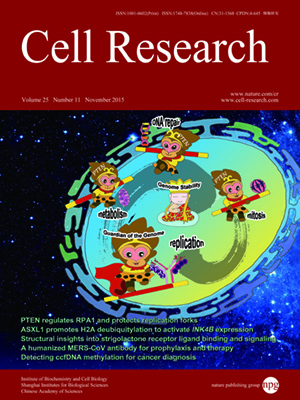
Volume 25, No 11, Nov 2015
ISSN: 1001-0602
EISSN: 1748-7838 2018
impact factor 17.848*
(Clarivate Analytics, 2019)
Volume 25 Issue 11, November 2015: 1189-1204
ORIGINAL ARTICLES
PTEN regulates RPA1 and protects DNA replication forks
Guangxi Wang1,*, Yang Li1,*, Pan Wang1, Hui Liang1, Ming Cui1, Minglu Zhu1, Limei Guo1, Qian Su2, Yujie Sun2, Michael A McNutt1 and Yuxin Yin1
1Institute of Systems Biomedicine, Department of Pathology, School of Basic Medical Sciences, Peking-Tsinghua Center for Life Sciences, Peking University Health Science Center, Beijing 100191 China
2Biodynamic Optical Imaging Center, Peking University, Beijing 100871, China
Correspondence: Yuxin Yin, Tel: +(86) 10-8280-1237 Fax: +(86) 10-8280-1380(yinyuxin@hsc.pku.edu.cn)
Tumor suppressor PTEN regulates cellular activities and controls genome stability through multiple mechanisms. In this study, we report that PTEN is necessary for the protection of DNA replication forks against replication stress. We show that deletion of PTEN leads to replication fork collapse and chromosomal instability upon fork stalling following nucleotide depletion induced by hydroxyurea. PTEN is physically associated with replication protein A 1 (RPA1) via the RPA1 C-terminal domain. STORM and iPOND reveal that PTEN is localized at replication sites and promotes RPA1 accumulation on replication forks. PTEN recruits the deubiquitinase OTUB1 to mediate RPA1 deubiquitination. RPA1 deletion confers a phenotype like that observed in PTEN knockout cells with stalling of replication forks. Expression of PTEN and RPA1 shows strong correlation in colorectal cancer. Heterozygous disruption of RPA1 promotes tumorigenesis in mice. These results demonstrate that PTEN is essential for DNA replication fork protection. We propose that RPA1 is a target of PTEN function in fork protection and that PTEN maintains genome stability through regulation of DNA replication.
10.1038/cr.2015.115
FULL TEXT | PDF
Browse 2451


